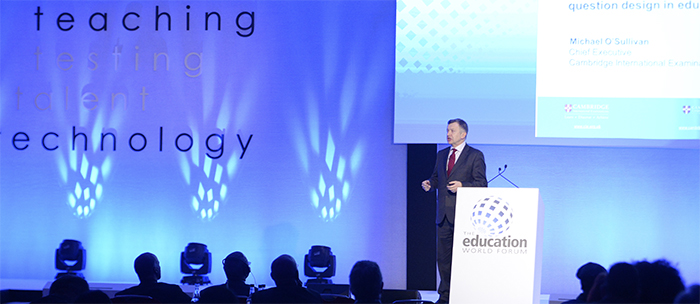Our Chief Executive, Michael O’Sullivan, used his keynote speech at this year’s Education World Forum to deliver a simple message. He talked about the value of good quality questions – something we care a lot about at Cambridge.
Why are ‘good questions’ so important?
In his speech, Michael highlighted the following:
- Good questions give students the chance to share what they know.
- Good questions can provoke deeper thinking and lead students to make new connections and want to know more.
- Good questions are crucial for high-quality assessment and for high-quality teaching.
The specific examples Michael gave were refreshing. Their simplicity and familiar scale were a welcome contrast to the vast pressure on governments to deliver improvements in educational outcomes. At this, the largest international gathering of education ministers in the world, that pressure seems to point towards the same basic truth that we all know: every child deserves a good education and the chance to fulfil their potential. Every nation’s future rests on its ability to realise the potential of its people. Although more children have access to school education than ever before, we still have a lot to do in order to achieve the United Nations Sustainable Development Goal of inclusive, quality education for all by 2030.
At the forum, ministers reflected on the fact that some countries face tougher structural challenges than others. Despite this, there was a strong sense of optimism and shared endeavour at the forum – it was fantastically positive, even optimistic.
An opportunity to engage
Each year the Education World Forum gives us an opportunity to engage with politicians and officials from ministries of education who we work with directly or in whose education systems Cambridge schools, curricula and assessments play a part. The forum is a brilliant event for ministers and ministry officials from all over the world to share experiences of progress made and perspectives on new ideas and opportunities.
It struck me that the forum’s positive spirit and sense of shared endeavour arise from some unifying characteristics of education. Despite obvious structural and economic disparities between the represented countries, it is also true that in every region of the world, there are some examples of success. In every jurisdiction there are challenges in delivering uniformly high-quality education in this changing world. More importantly, the route to improvement in every context lies in locally relevant policy choices that appreciate the complexity of education systems. For systems to improve, coherence between curriculum, teaching and assessment is vital. This is evident in examples where improvements are being made and where the greatest successes are enjoyed.
Good coherent systems rely on good coherent questions. Good questions give specialists in education the chance to share what they know. Good questions can also provoke deeper thinking which leads specialists to make new connections in the educational sphere. High-quality curriculum design starts with good questions and good questions are what high-quality teaching and assessment are made of.





